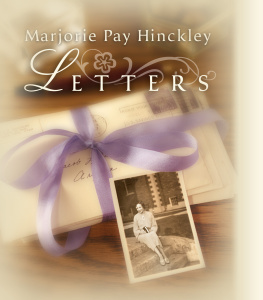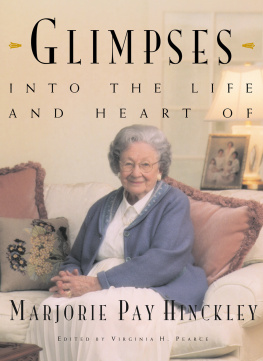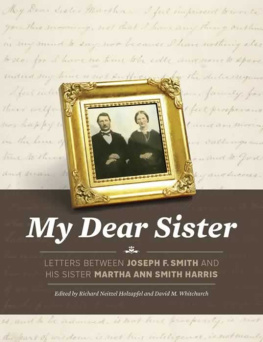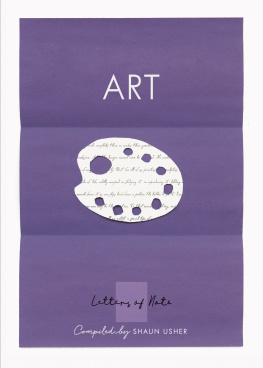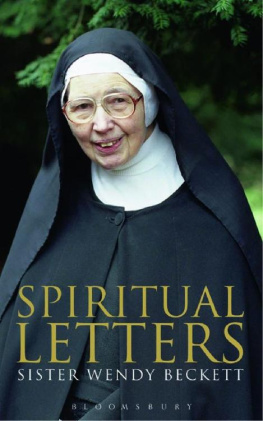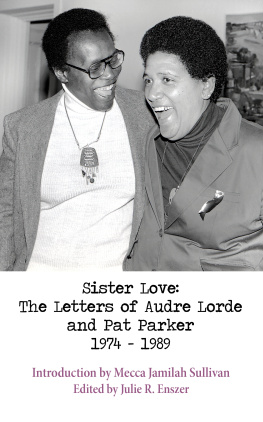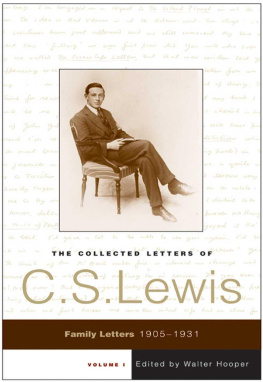Letters
Marjorie Pay Hinckley
2004 Intellectual Reserve, Inc.
All rights reserved. No part of this book may be reproduced in any form or by any means without permission in writing from the publisher, Deseret Book Company, P.O. Box 30178, Salt Lake City Utah 30178. This work is not an official publication of The Church of Jesus Christ of Latter-day Saints. The views expressed herein are the responsibility of the author and do not necessarily represent the position of the Church or of Deseret Book. Deseret Book is a registered trademark of Deseret Book Company.
The publisher expresses thanks to the family of Marjorie Pay Hinckley for graciously sharing these letters to benefit the Missionary Book of Mormon Fund.
Hinckley, Marjorie Pay.
[Correspondence. Selections]
Letters / Marjorie Pay Hinckley.
p. cm.
ISBN 1-59038-387-7 (hardcover : alk. paper)
1. Hinckley, MarjoriePayCorrespondence. 2. MormonsBiography.
3. MormonsReligious life. I. Title.
BX8695.H57A4 2004
289.3'092dc22
2004017698
Printed in the United States of America 72076
Publishers Printing, SaltLake City, UT
10 9 8 7 6 5 4 3 2 1
Introduction
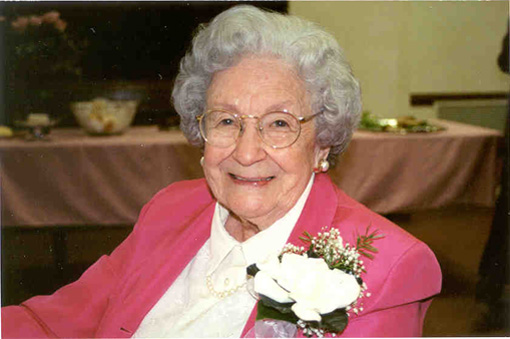
July 20, 2004
Salt Lake City,Utah
Dear Reader,
It is a bright summer morning in the Valley of the GreatSalt Lake as we write this letter. There are a few wispy clouds in a blue sky,and the mountains still have just a bit of snow. We have been reading some ofour mothers letters and having a wonderful time.
Our parents belong to what may be the last generation ofletter writers. For them, letters were the primary means of communication withfamily members separated by distance. Telegrams and long-distancetelephone calls were expensive and used only for emergencies or very specialoccasions. There was no e-mail or instant messaging. So writingletters was part of lifes routine. When family members lived out of town,letters traveled back and forth and kept them connected. Even when traveling onvacation, people sent letters and postcards as a link to those left behind.
In the spectrum of communication, a letter falls somewherebetween a conversation and a journal entry. Conversations are spontaneous andreal, but they are subject to the vagaries of memory, and our memories seem tobe getting less reliable every year. Journals are a gift to future generations,but they are often stilted, self-conscious, and wooden. Althoughjournal entries can be enlightening and deeply personal, they are written notto an individual but to some ethereal Dear Diary or to posterity as a whole.
Ah, but a letter... a letter is written to areal person, flesh and blood. Both the writer and the recipient are in themiddle of life, not off in some theoretical laboratory. Letters always havecontext. They exist within the political and social times. Personal and publicevents provide context, and letters always live in the context ofrelationships. Best of all, letters are there to be read again, years later,word for word as they were written. That is, if the recipient is smart enoughto save them!
Mother wrote letters to her parents, to her siblings, to ourfather, to each of us, and to each of our children. She sometimes wrote groupletters, but more often, she wrote to us one at a time, during the times weindividually lived away from Salt Lake City. Of all of the things that she leftbehind when she passed away at the age of ninety-two, we treasurenothing more than her letters and postcards. Sadly enough, most of us failed tokeep these treasures. Kathy, alone, seems to have been the most consistentkeeper of Mothers letters, as you will notice in the pages of this littlebook. We are so grateful to her. Are oldest children always the most responsible about everything?
Addressed to Kathy or not, we love reading and rereadingMothers letters. We hear her voice; she returns to our circle and helps usremember earlier times. We read her questions and remember the answers we mighthave given. We see in our memory the familiar surroundings oflong-gone days. In the touch of the paper and the tidy, smallhandwriting we are tangibly connected again.
We cannot think of a way that she could have better passedon her faith in us and in the gospel. Never preachy or critical, her values andgood advice were woven together with genuine love. Her letters were uniformlyaffirming, nourishing, reassuring, encouraging, lighthearted, and fortifying.We always felt that she found great pleasure in us, even though we caused herno end of irritation and hard work. Her excitement about life, people, and thisamazing world fairly leapt off the pages and into our hearts. Her newsbulletins about members of the family bound us to one another when we were toobusy to stay in constant touch ourselves. Through her letters, we also came tounderstand more fully her love and affection for our father as well as hercomplete and wholehearted devotion to the Kingdom. Although her behavior andconversations always reflected these things, they seem to be so clearlyarticulated in her letters. In fact, letters provide just enough distance thatwe can sometimes say the sweet things that we might be a bit too timid to sayface-to-face.
Frankly, we feel reluctant to publish these letters,wondering how an unrelated reader could possibly find them interesting.However, on reflection, we know that we find it a rare treat to read familyletters of others. We are always curious to know what it might be like to livein someone elses family. So perhaps you might like to know what our mothersaid to us, to our father, to her parents, or to her siblings when no one elsewas listening. Perhaps you wonder about the dailyness of someone elseslifethe behind-closed-doors thoughts and tasksthat you know about your own family but can only guess about others.
We have also resisted the publication of these letters forfear it may appear that we are exploiting Mothers life for financial gain. Wehave consented only with the understanding that all royalties will go to theMissionary Book of Mormon Fund. She would have welcomed the opportunity tofurther the distribution of that sacred volume, which she constantly read andfrom which she frequently quoted.
And so, we offer this sampling of Mothers letters. Theyappear essentially as she wrote them, although names of people other than familymembers have been omitted, and some standardizing of spelling and punctuationhas been done. We hope that you will see them as a celebration of the power ofthe ordinary. We hope that as you peek into the Monday, Tuesday, andWednesday-ness of her life, you will see with new eyes the value ofyour own. And, most of all, we hope that your family will decide to write andsave more letters.
Having a wonderful time. We only wish you were here, Mother!
Sincerely,
The Children of Marjorie Pay Hinckley
Kathleen Barnes Walker,Richard Hinckley, Virginia Pearce,
Clark Hinckley, Jane Dudley
Letters from
a Young Wife and Mother
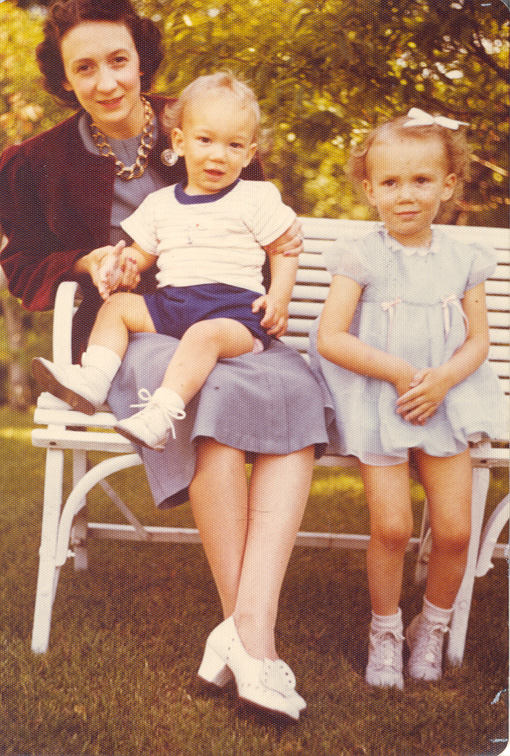
Marjorie Hinckley with her children Dick and Kathy
The letters in this first section were written in 1945, which was an unusual year for the Hinckley family. World War II was still raging, andGordon had left employment with the Church and was working with the Denver& Rio Grande Railroad as part of the war effort. He arrived in Denver inOctober 1944, but wartime housing shortages made it difficult to find a placesuitable to accommodate his growing family. Despite his relentless searching,he was unable to secure a home to rent until January 1945, at which timeMarjorie and the children joined him.

